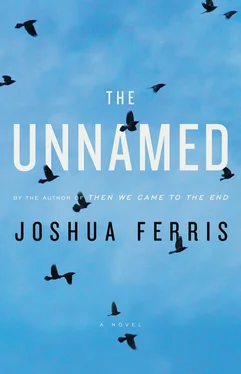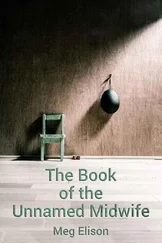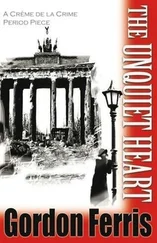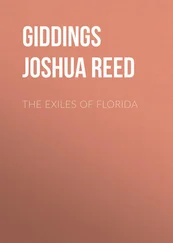He made it to the scenic drive. He fell to his knees in the rock beside the road. He told himself to get up. Don’t fall asleep, he said. Tourists were gathered at the fence to behold the wonder. The green valley cut a snaking halfpipe through the brown monoliths of the canyon. He could curl up in one of their backseats, or in the aspen grove that sprouted above the ravine past the row of parked cars, or inside the room of the La Quinta Inn just down the road. But he stood up and continued on his way along the shoulder of the highway.
The tree was a terrible luxury. He leaned up against it and fell asleep. It was meant to be a quick respite, but as soon as he woke he fell asleep again. It was a lone willow in a field. He woke and slept, woke and slept, and every time he woke, he considered lying down between two of the willow’s sinewy roots. But he slept upright for hours because to lie down would be indistinguishable from quitting.
He was taken far afield without water. Above him, daubs and strokes of rainless clouds. He came across a ranch house on a sloping dirt road nestled between sagebrush hills and knocked at the door. With a mouthful of dust, slow to conjure the name of the thing he needed, he said to the woman, who circled wide around him because he was a stranger and he sat on her porch with his back to her, “Water.” The woman went back inside and returned. She watched him clutch the glass with his primitive assortment of fingers and gulp the water down before spitting it out and vomiting the rest. “You have to take it slow,” she said.
It was a two-lane highway of blind curves and bent guardrails. The darkness was so absolute that headlights leapt over the paved summits to the effect of a poor man’s aurora. He sleepwalked from the shoulder into the lane. The car behind him flicked its brights on to find him drifting over. The driver swerved just as a pickup cleared the blind in the opposite lane, twenty yards away, and the two vehicles headed directly into each other. The truck lurched to a full stop close to the guardrail, only a foot from the drop-off. The car’s raging horn woke him. He stumbled back to the shoulder. The driver went around slowly, leaned into the passenger-side window and flipped him the bird to convey how offended he was by this show of dumb negligence. Then the truck pulled out and he was alone again on the highway.

A caravan of cyclists whirred past him in the slanting rain, leaving him in the wake of their fine, fast community. Their passing talk pierced him with longing. Geese with the white underbellies of bowling pins squawked overhead.
He sat in the back of a bar in a recess of tables with a half-finished beer in front of him, vaguely aware of a foosball game going on a few feet away. He fell asleep on the table. The bartender woke him at closing time. He went outside and resumed walking.
“Please don’t tell her I’m coming,” he wrote to Becka the next day, from a computer at a public library. “I don’t think I can make it.”
He broke a rule and spent a night in a rented room. He reentered a white world where scant traffic was treading delicately in the icy fall. It was a sanatorium of snow. Flurries mocked visibility and found cracks in his best gear. He did not make it east two miles when his will was pulled out from under him and he was forced to walk in a different direction. He woke later inside the tent and felt the pressing urge to make up for lost time. When he decamped, the sun was out and the snow had melted into a pristine damp that mellowed the earth like a trickling stream. He walked half the day only to come upon the same motel where he’d spent the night twenty-four hours earlier. His heart sank.
The glow in the distance appeared to intensify in pulse and color, it beat blood and energy like a diseased heart. The sun, reversing course, might have been setting in the east just over the edge of the lower range. He didn’t know what it was. Night had fallen, and the snow was thriving after hours of indifferent drift. The glow was situated directly in his path. Two men on horseback came at him at a trot, followed by a tether of additional horses.
“What are you doing here?” asked one.
“What are you doing?”
“Taking these horses to safety.”
Tim stumbled a little where he stood, having fallen asleep.
“You drunk?”
He got down on his haunches. “Just tired,” he said.
“If you’re gonna pass out,” said the man, “better you do it away from here. Highway’s closed.”
“Is there another route that takes me east?”
The man looked behind him in the direction of the glow. “See that fork? No, it’s too dark,” he said. “You’re going to hit a fork up there, leads you on if you take a left. Take a right instead. That’ll take you to the Wal-Mart and such.”
“Is that east?”
“If east is south.”
He got to his feet. The weight of the pack made him wobble. One of the horses stirred. He smiled faintly in the torpid light and continued on.
He tried to make it through a wind-driven brush fire. The air was thick with ash and pine smoke. He retreated. Two days later he walked the same route when all that remained were black stakes of trees stabbed into the pale hillside.
“Okay,” wrote Becka, “whatever, you won’t fly, you can’t fly. Whatever. At least let me come out there and get you. I drive to where you are, we tie you up and throw you in the trunk or something, and drive you back here. Why wouldn’t that work?”
He reread the email. It was a perfectly reasonable proposition. He tried to think of what he might say to make her understand why it would not work for him.
The truth made him a monster. It put his struggle, the one he was waging against his weak and determined body, before Becka, before Jane, before everyone.
He decided to tell a partial truth. During every hour, there was a moment of despair, he wrote in reply to her email, and during every day, an hour. In that hour, he resigned himself to never seeing them again. But he had made some progress since his last email, and, despite quitting every day, he had not yet quit. He was on his way, he wrote, he was on his way, he promised. And then he dispatched her elegant solution with a single line that she could not possibly understand, obscuring his monstrosity, but clarifying for him nothing short of the reason he continued to live and breathe.
“I can’t have you pick me up because I’m still at war,” he wrote, “and I’m determined to win.”
At first his body was subject only to little local breakdowns, to infections and inflammations, to aches, cricks, tweaks, cramps, contusions, retentions, swellings, fevers, tinglings, hackings, spasms, limps, displacements, dizziness, stiffness, chafing, agitations, confusions, staggerings, spells of low blood sugar, and the normal wear and tear of age. Yet it persisted to function more or less with an all-hands-on-deck discipline. He was certain that it had a mind of its own, an unassailable cellular will. If it were not that it needed sleep, and a bit of food, it would not need him. It would walk without him, after his mind had dimmed and died. It would walk until it collapsed into a pile of whitened and terrigenous bones.

He crossed the creek at a ford and continued east to lower elevations. He took the arterial roads that linked the logging towns with the tourist centers. Ten days later he left the rain shadow of the Rockies and walked out of Colorado.
Farewell Orion and the winter stars. He walked past a low-lying billboard that had weathered into a long canvas of abstract expression, above which stood a regal plastic pony in midstride. The pony had a brown coat and a pitch-black mane. The black mane matched the pony’s hooves and forelegs. The billboard pony was a Great Plains totem presiding over the safety of passing automobiles. He thought he could discern, in the far corner of the billboard, a figure of piety wrapped in a nun’s wimple, which some attentive kook could legitimately claim was a silhouette of the Holy Mother. Little birds roosted at the pony’s feet.
Читать дальше













